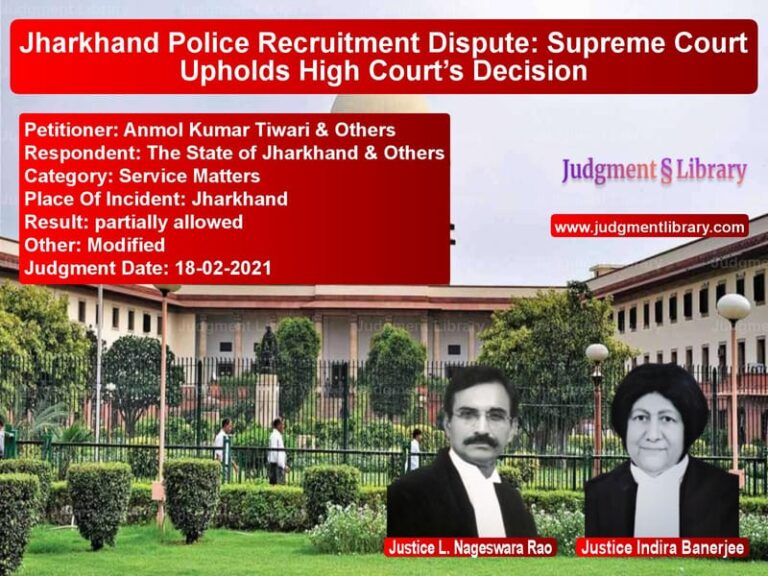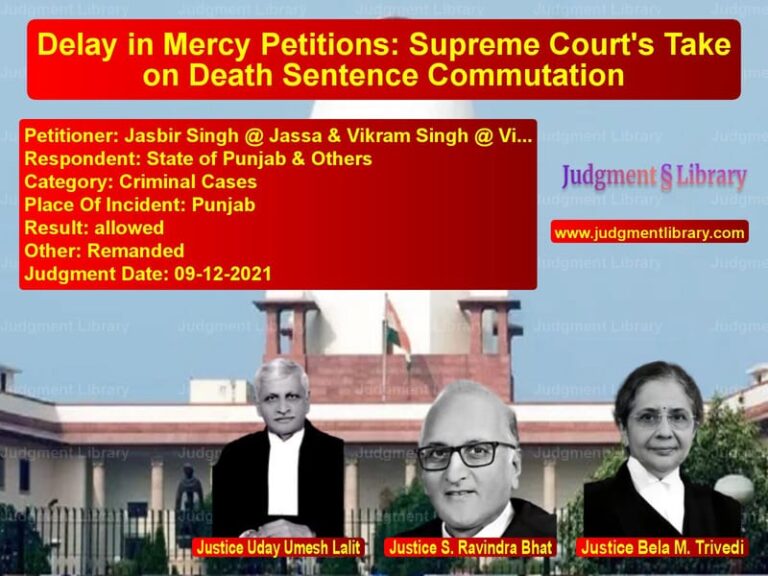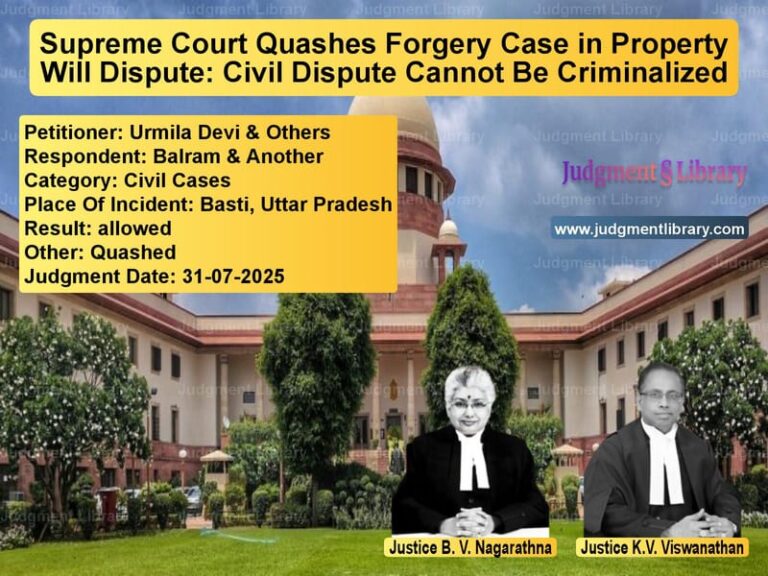Landlord-Tenant Dispute: Supreme Court’s Ruling on Delayed Execution of Decrees
The Supreme Court of India, in the case of Pradeep Mehra v. Harijivan J. Jethwa & Ors., addressed the longstanding issue of delayed execution proceedings and misuse of legal provisions to prolong eviction. The case highlights how legal technicalities are often exploited to prevent rightful decree-holders from enjoying the benefits of court orders, thus delaying justice. The judgment serves as a strong message on the necessity of timely execution and curbing legal abuse in civil litigation.
Background of the Case
The appellant, Pradeep Mehra, is the landlord of a commercial property in Mumbai. The respondents, the legal representatives of the deceased tenant, Harijivan J. Jethwa, had been occupying the premises for several years. A dispute arose regarding non-payment of rent, leading to the landlord filing an eviction suit before the Small Causes Court in Mumbai.
The parties reached a settlement, resulting in a consent decree on June 11, 2005. According to the decree:
- The tenants could continue occupying the premises if they paid rent regularly.
- If the tenants defaulted on rent for two consecutive months, they would be liable for eviction.
However, the tenants failed to comply with these terms, leading to an application for execution of the decree. The executing court, on February 12, 2013, ruled in favor of the landlord and permitted execution.
Legal Challenges and Delays
Despite the clear ruling in favor of execution, the tenants continued to challenge the proceedings:
- They did not appeal the 2013 execution order at the time.
- Four years later, in January 2017, they filed an application before the executing court, seeking to challenge the 2013 order.
- The landlord objected, arguing that the application was an attempt to reopen a settled matter.
The executing court rejected the tenants’ objections on September 28, 2017, emphasizing that an executing court cannot go behind a decree. However, the tenants pursued further litigation, leading to multiple layers of appeals, revisions, and delays.
Key Legal Issues
The case raised crucial questions about the execution of decrees and the scope of judicial review under Section 47 of the Code of Civil Procedure (CPC):
- Can an executing court re-examine a decree once execution has been ordered?
- Does a judgment-debtor (tenant) have unlimited rights to challenge execution even after years of inaction?
- Does the principle of res judicata apply to execution proceedings?
Arguments by the Appellant (Landlord)
- The tenants defaulted on rent, violating the terms of the consent decree.
- The executing court had already ruled in favor of execution in 2013, which had attained finality.
- The tenants’ objections were frivolous and intended to delay execution indefinitely.
- Repeated challenges violate the principle of res judicata, which bars re-litigation of settled matters.
- The court must uphold the sanctity of execution proceedings and prevent their misuse.
Arguments by the Respondents (Tenants)
- The tenants argued that they had not defaulted on rent payments.
- They contended that the executing court had the power under Section 47 CPC to re-examine the decree’s enforceability.
- They claimed that the execution order of 2013 was erroneous and could be reviewed at any time.
Supreme Court’s Observations
The Supreme Court, while delivering its judgment, made several key observations:
- Execution proceedings are unnecessarily delayed due to misuse of legal provisions, defeating the purpose of obtaining a decree.
- Section 47 CPC limits the scope of the executing court to issues related to execution, discharge, or satisfaction of the decree.
- The executing court cannot go behind a decree or question its validity.
- The tenants’ objections were frivolous and should have been raised before the appropriate forum at the correct time.
- Allowing repeated challenges to execution undermines the judicial process and weakens public confidence in the legal system.
The Court cited its previous ruling in Rahul S. Shah v. Jinendra Kumar Gandhi & Others (2021) 6 SCC 418, where it had observed:
“The execution proceedings, which are supposed to be a handmaid of justice and subserve the cause of justice, are, in effect, becoming tools which are being easily misused to obstruct justice.”
Final Judgment
The Supreme Court set aside the orders of the appellate court and the High Court, reinstating the executing court’s decision. It issued the following directives:
- The executing court must proceed with the eviction without any further delay.
- The eviction process must be completed within six months.
- The interim order of July 27, 2021, which had stalled execution, was vacated.
- Courts should ensure that execution proceedings are not prolonged by frivolous objections.
Impact of the Judgment
This ruling has far-reaching implications:
- It strengthens the principle that execution proceedings should not be treated as a retrial.
- It reinforces that once a decree has attained finality, it cannot be endlessly challenged.
- It discourages tenants and other judgment-debtors from misusing legal provisions to delay execution.
- It emphasizes the role of courts in ensuring timely justice.
The Supreme Court’s ruling in this case serves as a strong reminder of the importance of enforcing decrees promptly. By rejecting frivolous challenges and setting a clear timeline for execution, the Court has reinforced the fundamental principle that justice delayed is justice denied.
Petitioner Name: Pradeep Mehra.Respondent Name: Harijivan J. Jethwa & Ors..Judgment By: Justice Sanjay Kishan Kaul, Justice Sudhanshu Dhulia.Place Of Incident: Mumbai, India.Judgment Date: 30-10-2023.
Don’t miss out on the full details! Download the complete judgment in PDF format below and gain valuable insights instantly!
Download Judgment: pradeep-mehra-vs-harijivan-j.-jethwa-supreme-court-of-india-judgment-dated-30-10-2023.pdf
Directly Download Judgment: Directly download this Judgment
See all petitions in Property Disputes
See all petitions in Landlord-Tenant Disputes
See all petitions in Specific Performance
See all petitions in Judgment by Sanjay Kishan Kaul
See all petitions in Judgment by Sudhanshu Dhulia
See all petitions in allowed
See all petitions in supreme court of India judgments October 2023
See all petitions in 2023 judgments
See all posts in Civil Cases Category
See all allowed petitions in Civil Cases Category
See all Dismissed petitions in Civil Cases Category
See all partially allowed petitions in Civil Cases Category







